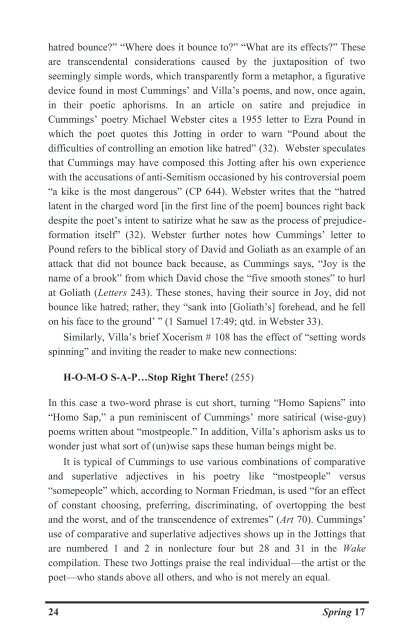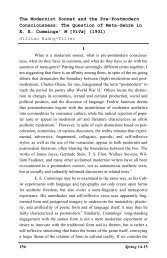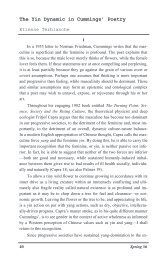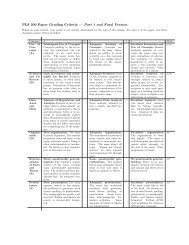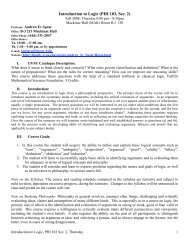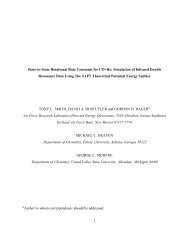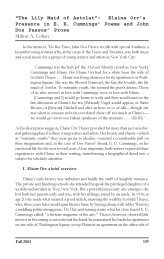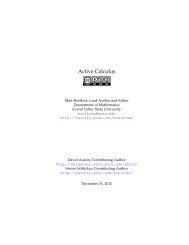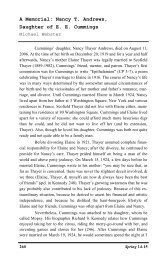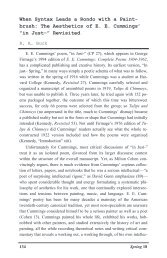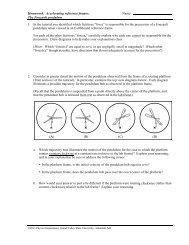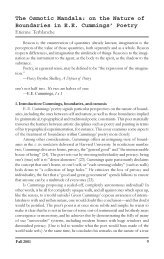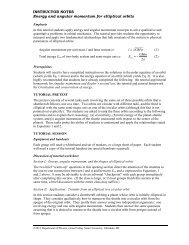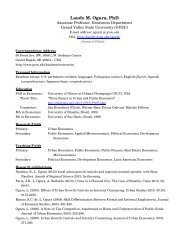E.E. Cummings' 'Jottings' and José Garcia Villa's 'Xocerisms ... - Gvsu
E.E. Cummings' 'Jottings' and José Garcia Villa's 'Xocerisms ... - Gvsu
E.E. Cummings' 'Jottings' and José Garcia Villa's 'Xocerisms ... - Gvsu
You also want an ePaper? Increase the reach of your titles
YUMPU automatically turns print PDFs into web optimized ePapers that Google loves.
hatred bounce?” “Where does it bounce to?” “What are its effects?” Theseare transcendental considerations caused by the juxtaposition of twoseemingly simple words, which transparently form a metaphor, a figurativedevice found in most Cummings’ <strong>and</strong> Villa’s poems, <strong>and</strong> now, once again,in their poetic aphorisms. In an article on satire <strong>and</strong> prejudice inCummings’ poetry Michael Webster cites a 1955 letter to Ezra Pound inwhich the poet quotes this Jotting in order to warn “Pound about thedifficulties of controlling an emotion like hatred” (32). Webster speculatesthat Cummings may have composed this Jotting after his own experiencewith the accusations of anti-Semitism occasioned by his controversial poem“a kike is the most dangerous” (CP 644). Webster writes that the “hatredlatent in the charged word [in the first line of the poem] bounces right backdespite the poet’s intent to satirize what he saw as the process of prejudiceformationitself” (32). Webster further notes how Cummings’ letter toPound refers to the biblical story of David <strong>and</strong> Goliath as an example of anattack that did not bounce back because, as Cummings says, “Joy is thename of a brook” from which David chose the “five smooth stones” to hurlat Goliath (Letters 243). These stones, having their source in Joy, did notbounce like hatred; rather, they “sank into [Goliath’s] forehead, <strong>and</strong> he fellon his face to the ground’ ” (1 Samuel 17:49; qtd. in Webster 33).Similarly, Villa’s brief Xocerism # 108 has the effect of “setting wordsspinning” <strong>and</strong> inviting the reader to make new connections:H-O-M-O S-A-P…Stop Right There! (255)In this case a two-word phrase is cut short, turning “Homo Sapiens” into“Homo Sap,” a pun reminiscent of Cummings’ more satirical (wise-guy)poems written about “mostpeople.” In addition, Villa’s aphorism asks us towonder just what sort of (un)wise saps these human beings might be.It is typical of Cummings to use various combinations of comparative<strong>and</strong> superlative adjectives in his poetry like “mostpeople” versus“somepeople” which, according to Norman Friedman, is used “for an effectof constant choosing, preferring, discriminating, of overtopping the best<strong>and</strong> the worst, <strong>and</strong> of the transcendence of extremes” (Art 70). Cummings’use of comparative <strong>and</strong> superlative adjectives shows up in the Jottings thatare numbered 1 <strong>and</strong> 2 in nonlecture four but 28 <strong>and</strong> 31 in the Wakecompilation. These two Jottings praise the real individual—the artist or thepoet—who st<strong>and</strong>s above all others, <strong>and</strong> who is not merely an equal.24 Spring 17


